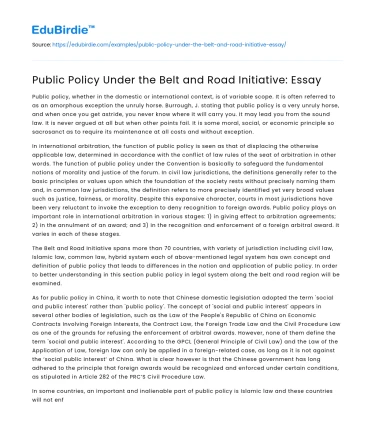Public policy, whether in the domestic or international context, is of variable scope. It is often referred to as an amorphous exception the unruly horse. Burrough, J. stating that public policy is a very unruly horse, and when once you get astride, you never know where it will carry you. It may lead you from the sound law. It is never argued at all but when other points fail. It is some moral, social, or economic principle so sacrosanct as to require its maintenance at all costs and without exception.
In international arbitration, the function of public policy is seen as that of displacing the otherwise applicable law, determined in accordance with the conflict of law rules of the seat of arbitration in other words. The function of public policy under the Convention is basically to safeguard the fundamental notions of morality and justice of the forum. In civil law jurisdictions, the definitions generally refer to the basic principles or values upon which the foundation of the society rests without precisely naming them and, in common law jurisdictions, the definition refers to more precisely identified yet very broad values such as justice, fairness, or morality. Despite this expansive character, courts in most jurisdictions have been very reluctant to invoke the exception to deny recognition to foreign awards. Public policy plays an important role in international arbitration in various stages: 1) in giving effect to arbitration agreements; 2) in the annulment of an award; and 3) in the recognition and enforcement of a foreign arbitral award. It varies in each of these stages.
Save your time!
We can take care of your essay
- Proper editing and formatting
- Free revision, title page, and bibliography
- Flexible prices and money-back guarantee
The Belt and Road Initiative spans more than 70 countries, with variety of jurisdiction including civil law, Islamic law, common law, hybrid system each of above-mentioned legal system has own concept and definition of public policy that leads to differences in the notion and application of public policy. In order to better understanding in this section public policy in legal system along the belt and road region will be examined.
As for public policy in China, it worth to note that Chinese domestic legislation adopted the term 'social and public interest' rather than 'public policy'. The concept of 'social and public interest' appears in several other bodies of legislation, such as the Law of the People's Republic of China on Economic Contracts Involving Foreign Interests, the Contract Law, the Foreign Trade Law and the Civil Procedure Law as one of the grounds for refusing the enforcement of arbitral awards. However, none of them define the term 'social and public interest'. According to the GPCL (General Principle of Civil Law) and the Law of the Application of Law, foreign law can only be applied in a foreign-related case, as long as it is not against the ‘social public interest’ of China. What is clear however is that the Chinese government has long adhered to the principle that foreign awards would be recognized and enforced under certain conditions, as stipulated in Article 282 of the PRC’S Civil Procedure Law.
In some countries, an important and inalienable part of public policy is Islamic law and these countries will not enforce awards that are contrary to the Muslim Shari’a. For example, the Civil Code of the United Arab Emirates provides that public policy includes “rules relating to personal status such as marriage, inheritance, descent, and rules concerning governance, freedom of commerce, trading in wealth, rules of personal property, and provisions and foundations on which the society is based in a way that do not violate final decisions and major principles of Islamic Shari’a. It is said that the attitude of Islamic law towards foreign judgments and awards is based on the principle that non-Muslims are free to enter into contracts and to have business relations that are valid according to their own religions without the need to take into account the concept of prohibition and authorization in Islamic law; however, if a Muslim is a party to the contract, Islamic law and public policy apply.
As far as common law is concerned, it should be noted, however, that EU member states share common values and standards on various issues, so achieving a transnational public policy seems easier according to the statement that EU member states have judicial discretion to determine the essence of the considerations that constitute their jurisdiction. However, due to the supranational nature of EU laws and directives regarding EU member states, individual member states are also obliged to take into account EU legislation when determining the main content of public policy. The concept of what would be injurious or harmful to the public good or the public interest is also conditioned by the unique interplay of the social, political, moral, economic, and other relevant elements of each state and this has also varied from time to time and from state to state. For instance, the common law rule against compound interest has been abandoned in countries such as England, Canada, Australia, and India and is no longer against public policy. Russian courts have held that a penalty does not violate public policy, while on the other hand, the Portuguese courts have held that imposition of a penalty violates its public policy.
In sum, the fundamental interest of the BRI, aside from the development of regional infrastructure, is the bolstering of cross-border commercial and trade cooperation among the Belt and Road nations. Regional prosperity, envisaged as an interest of all jurisdictions in the Belt and Road Asian region, may be facilitated through the application of harmonized public policy.






 Stuck on your essay?
Stuck on your essay?

